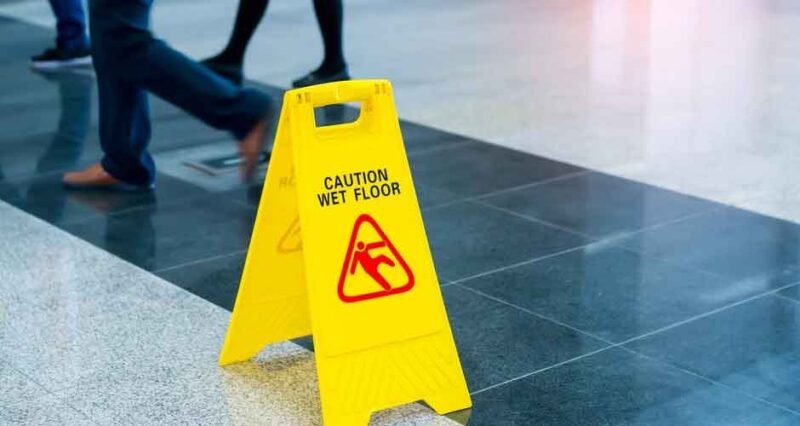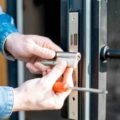
The role of personal choices and conditions in slip and fall accidents is significant and often overlooked. These accidents can result in serious injuries, underscoring the importance of recognizing individual contributions to such incidents:
- Wet or uneven surfaces:
Slippery or uneven flooring is a major culprit. Wet floors from spills, rain, or cleaning activities can lead to slips, especially in places like restaurants, supermarkets, or public restrooms. Uneven sidewalks, damaged tiles, or poorly maintained walkways can cause tripping hazards, contributing to falls.
- Inadequate signage and lighting:
Inadequate warning signs or poor lighting can significantly increase the risk of slip and fall accidents. Without proper signage, individuals may be unaware of potential hazards. Dimly lit areas obscure obstacles, making it challenging for people to navigate safely.
- Vision and awareness:
Personal attentiveness and awareness of one’s surroundings are crucial. Distractions, such as using a smartphone while walking, can divert attention away from potential hazards. Good vision and cognitive factors contribute significantly to fall prevention, underscoring the importance of personal responsibility.
Common factors that make your slip and fall worse
In the realm of slip and fall accidents, numerous factors can significantly amplify the severity of injuries incurred. Recognizing these variables is paramount for minimizing the consequences of such incidents and championing safety. Presented below are three prevalent factors that can intensify slip and fall accidents:
1. Surface hardness:
The hardness of the surface where a slip and fall occurs can significantly affect the outcome. Hard surfaces, such as concrete or tile, provide little to no shock absorption upon impact, resulting in a higher risk of fractures, head injuries, or internal trauma. Softer surfaces like carpet or rubber may lessen the severity of injuries by absorbing some of the force.
2. Falling distance:
The distance over which an individual falls can markedly exacerbate the injuries sustained in a slip-and-fall accident. Falling from a greater height elevates the potential for more severe injuries. For instance, a fall down a flight of stairs can result in significantly more extensive injuries compared to a slip that occurs on the same level. The angle and speed of the fall further impact the severity of injuries, making it essential to consider these factors in injury assessment.
3. Body positioning:
The positioning of a person’s body during a slip and fall incident plays a pivotal role in determining the nature and severity of injuries sustained. Awkward or uncontrolled body positions can lead to more detrimental outcomes. For instance, falling backward or head-first can result in severe head and spinal injuries due to the impact on the head and neck. Understanding the significance of body positioning is crucial for both injury assessment and prevention. Promoting awareness of how to react during a fall and improving safety measures can help individuals minimize the risks associated with slip and fall accidents.
Benefits of hiring experienced personal injury advocates
When it comes to seeking compensation for injuries resulting from another party’s negligence, the decision to enlist experienced personal injury advocates can prove exceedingly advantageous. These seasoned experts bring a treasure trove of specialized knowledge and skills to the forefront, resulting in a tangible and often transformative impact on the outcome of personal injury cases. Below are outlined three pivotal benefits of engaging the services of these adept professionals:
1. In-depth legal knowledge:
Experienced personal injury advocates offer a profound comprehension of personal injury law, insurance regulations, and past case precedents. Their ability to assess the merits of a case, spot potential legal intricacies, and devise optimal legal strategies is grounded in this comprehensive knowledge. This expertise empowers them to champion the cause of their clients effectively, securing just compensation to cover medical expenses, lost wages, and the intangible toll of pain and suffering.
2. Effective negotiation skills:
Mastery in negotiation is a hallmark of adept personal injury advocates. These seasoned professionals excel in engaging with insurance companies and opposing parties to attain advantageous settlements. Their capacity to harness their profound legal expertise and insights into the subtleties of a case enables them to orchestrate negotiations that culminate in maximal compensation. This skill assumes paramount importance when contending with insurance adjusters who may endeavor to curtail payouts to the minimum.
3. Courtroom experience:
In cases where negotiations fail to yield a fair settlement, experienced personal injury advocates are prepared to take the matter to court. They have the courtroom experience necessary to present a compelling case to a judge and jury. This expertise instills confidence in clients, assuring them that their interests are well-represented in the event of a trial.
How to find reliable advocates?
Identifying a reliable advocate is a crucial task in obtaining effective legal representation or support in various matters. Advocates play a pivotal role in ensuring your rights are upheld and your interests are safeguarded. To secure a reliable advocate, a systematic approach is essential. This entails seeking referrals, conducting comprehensive online research, consulting with local bar associations, conducting initial meetings, verifying credentials, and scrutinizing references. Additionally, prioritizing transparency and trusting your instincts during the selection process is paramount. By adhering to these steps, you can confidently pinpoint advocates who possess the necessary qualifications to provide the legal assistance you require while ensuring your best interests are protected.


